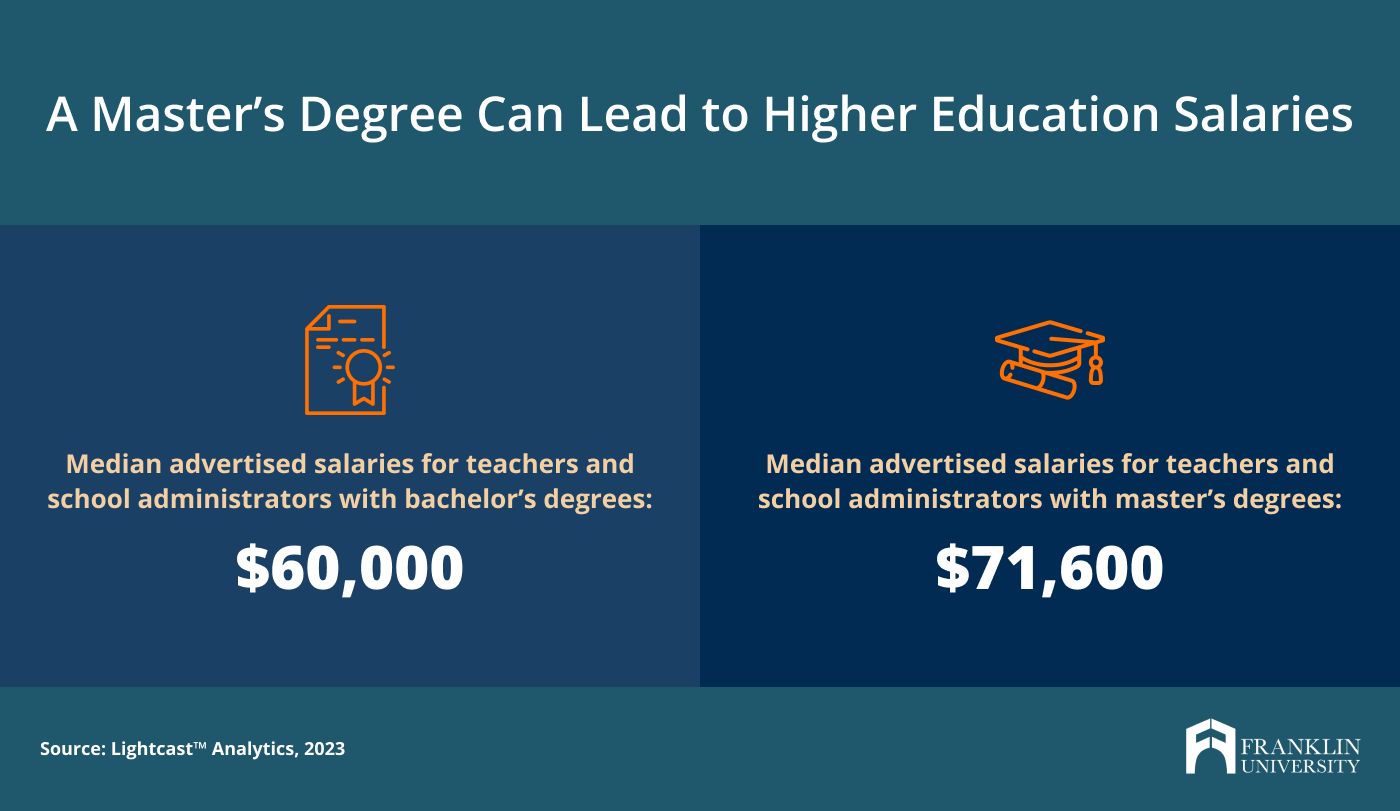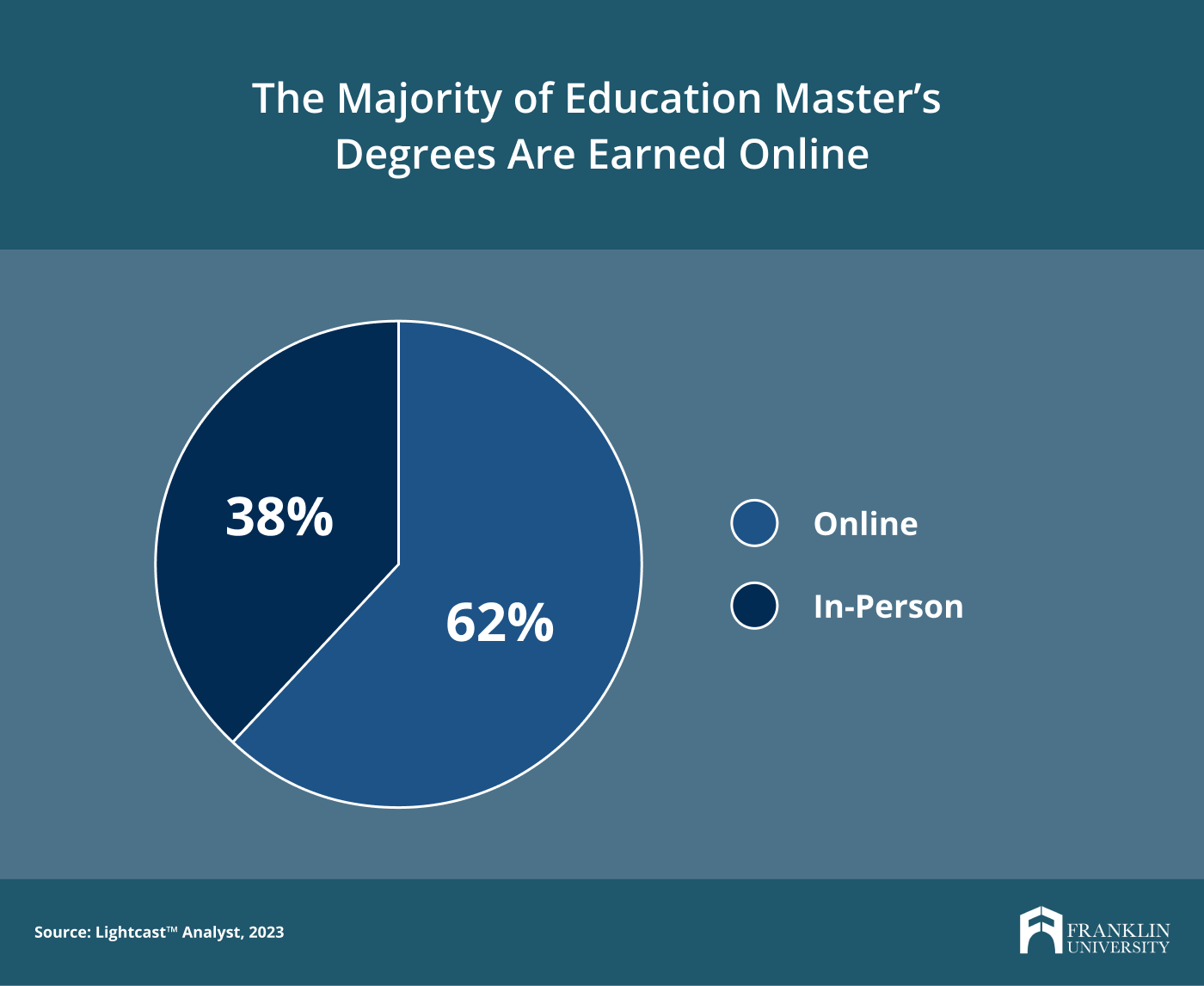Request Information
We're Sorry
There was an unexpected error with the form (your web browser was unable to retrieve some required data from our servers). This kind of error may occur if you have temporarily lost your internet connection. If you're able to verify that your internet connection is stable and the error persists, the Franklin University Help Desk is available to assist you at helpdesk@franklin.edu, 614.947.6682 (local), or 1.866.435.7006 (toll free).
Just a moment while we process your submission.

How Long Does it Take to Get a Master’s Degree in Education?
For many educators eager to increase their skills and qualifications, a master’s degree is a natural next step. Earning a master’s can also help you reach higher salaries or progress into leadership positions inside or outside the school system.
However, choosing and embarking on an education master’s program can be daunting. Before you enroll, it’s essential to consider the required investment of money and time carefully.
What Is a Master’s Degree in Education?
An education master’s degree is a graduate program designed for teachers, administrators and others working in the education field.
Master’s degrees in education come in several forms, including the Master of Education (M.Ed.), Master of Arts in Education (M.A. Ed.), Master of Science in Education (M.S. Ed.) and Master of Arts in Teaching (M.A.T.). Each of these programs offers a unique approach, so it’s wise to carefully assess your career goals and how each degree option can help you achieve them. For example, the Master of Arts in Teaching degree is primarily seen as a master’s degree for teachers who wish to develop their classroom abilities, while the M.Ed. is more versatile and suited for both teachers and those who wish to move into or advance in school leadership roles.
Across institutions, there can be significant variability in the curricula and approach to each type of master’s degree. Many schools also offer specialized versions of the major education master’s degrees. For example, Franklin’s M.Ed. in Education Leadership offers focus areas in K-12 Building-Level Leadership and in Higher Education Leadership.

How Long Does a Master’s Degree in Education Take?
Like curricula, the duration of master’s degrees varies between programs. Typically, education master’s degrees take one to two years of full-time study or two or more years of part-time study. Some institutions also offer summer-only options that stretch over multiple years for educators who cannot commit to classes during the school year.
Franklin’s M.Ed. degree is designed to help you move forward faster without taking time away from your career. You can graduate in as few as 12 months, and since you’ll take just one course at a time, you’ll never feel overwhelmed by competing assignments or priorities.
What Are the Requirements for a Master’s Degree in Education?
Each institution sets its own admissions requirements for education master’s programs. Generally speaking, master’s degree programs require an undergraduate degree for entry. Some schools may also ask for test scores, letters of recommendation and work experience. Franklin’s M.Ed. in Educational Leadership requires a bachelor’s degree in any field and a minimum GPA, but test scores and prior experience in the field are not necessary.
Get a FREE education career action plan filled with resources and recommendations from those who are already there.
Can You Earn a Master’s in Education Online?
Today, the majority of education master’s students earn their degrees online. Distance learning allows students to advance their careers while fulfilling their professional obligations and applying what they learn in real time – and thanks to the latest collaboration technology, online programs are just as interactive and engaging as their in-person counterparts.
Franklin’s online M.Ed. program is designed for maximum flexibility, making it ideal for educators who wish to earn their master’s degree while holding active classroom or administrative roles. In fact, during the program’s final capstone project, participants design a school improvement project grounded in their current professional environment, allowing them to apply online learning to real-world problems.

How Much Does a Master of Education Cost?
The cost of your master of education will depend on several factors, including the school you choose and whether you attend online or in person. Total costs of attendance can vary by tens of thousands of dollars, so it’s critical to do your research – especially because hidden fees and rising tuition costs can add up quickly.
Franklin’s M.Ed. program costs less than $25,000, and entering students automatically receive a $2,000 scholarship. Your tuition rate is locked as long as you remain an active student, which means you’ll know the total cost of your degree upfront without any surprises.
What Can You Do with a Master’s Degree in Education?
A master of education can help you grow as a classroom teacher or prepare you administrative or leadership roles. Common job titles for professionals with an M.Ed. include:
Elementary, middle school, or high school teacher
- Median advertised salary: $60,000
In most schools, elementary-level teachers specialize in a particular grade or age group, while middle school and high school teachers focus on a subject like math or science. While most states do not require public school teachers to hold a master’s degree, salary bands are usually tied to education levels, meaning that teachers with graduate degrees earn a higher salary throughout their career.
Curriculum director
- Median advertised salary: $99,100
Curriculum directors create curricula in keeping with local, state and federal education standards and work with teachers to ensure its effective implementation. Most school districts require that curriculum directors hold master’s degrees.
Director of special education
- Median advertised salary: $108,300
Special education directors may work at the school, district or even state level to set policy and practices for special education programs, ensure compliance with relevant laws and support special education teachers.
School principal
- Median advertised salary: $104,700
Principals may work at the elementary, middle or high school level to set the school’s direction, work with district leadership and create a positive environment for students, teachers and staff. Most states require public school principals to hold master’s degrees, and in all states, principals must attain school administrator certification to hold the role (requirements and pathways to certification vary). Private schools may set their own requirements.
Make the Most of Your Education Career
Now more than ever, the education field needs leaders prepared to take on entrenched and emerging challenges. Franklin’s theory-to-practice Master of Education degree prepares you to apply cutting-edge research to build effective, inclusive learning communities that extend beyond the walls of your school.
“Franklin’s program helps to create future-focused, student-centered leaders that are curious, compassionate, committed and competent,” says Dr. Patrick Bennett, vice president of academic quality and dean of Franklin’s School of Education.
You’ll learn from experienced educators and education leaders who understand the challenges you face and benefit from a flexible online format that allows you to graduate in as few as 12 months. With three start dates a year, Franklin is ready when you are.
Learn more about how you can advance your career with an M.Ed. from Franklin University.





